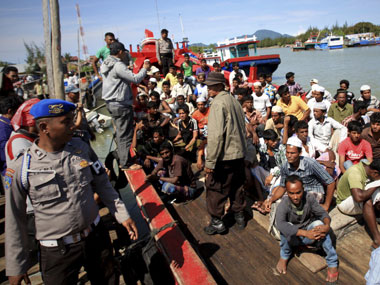Ahlul Bayt News Agency - Boats carrying about 500 members of Myanmar's long-persecuted Rohingya Muslim community washed to shore in western Indonesia on Sunday, with some of the people in need of medical attention, a migration official and a human rights advocate said.
The men, women and children arrived on two separate boats, one carrying around 430 people and the other 70, said Steve Hamilton, deputy chief of mission at the International Organization for Migration in Jakarta, Indonesia's capital.
Teams were racing to Mantang Puntong in Aceh province, where the boats landed, Hamilton said.
Rohingya Muslims have for decades suffered from state-sanctioned discrimination in Myanmar.
Attacks on the religious minority by Buddhist mobs in the last three years have sparked one of the biggest exoduses of boat people since the Vietnam War, sending 100,000 people fleeing, according to Chris Lewa, director of the Arakan Project, which has monitored the movements of Rohingya for more than a decade.
Lewa confirmed that nearly 500 Rohingya landed in Indonesia early Sunday.
Some were apparently weak due to lack of food and water, she said.
Though their first stop has in the past been Thailand, where the Rohingya waited in jungle camps while brokers collected hefty "ransoms" from family members before allowing them to continue their journeys onward, tactics have changed in recent months.
They are now being held on boats at sea, Lewa said, estimating that 7,000 to 8,000 Rohingya and Bangladeshi migrants are currently parked in the Malacca Straits, unable to disembark because of crackdowns on trafficking networks in Thailand and Malaysia, their primary destination.
Tightly confined, and with limited access to food and clean water, Lewa said she worries that the migrants' health is steadily deteriorating. Dozens of deaths have been reported in the last few months.
/129
source : AP
Sunday
10 May 2015
9:52:17 AM
689245
Islamophobia in Myanmar;
Over 500 long-persecuted Rohingya Muslims from Myanmar wash to shore in Indonesia

Boats carrying about 500 members of Myanmar's long-persecuted Rohingya Muslim community washed to shore in western Indonesia on Sunday, with some of the people in need of medical attention, a migration official and a human rights advocate said.
